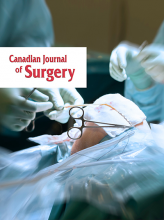Nurses are beyond essential to our health care systems. They are the engine as well as the heart of what we do. Nurses comfort our frightened and frazzled patients, care for them in their sickest time of need, and are arguably the single most important factor in determining a patient’s overall experience and satisfaction with the care they receive.
Despite this reality, nurses are under fire. They are struggling to a degree that is unlike any other in recent memory. Hospital systems are mandating substantial reductions in time off owing to staffing shortages. This includes both scheduled days off and planned vacations. Patients are frequently entering our health care systems with difficulties regulating their emotions; this is manifested as anger, impatience and aggression directed toward health care workers. As physicians under duress, we are asking more and more of our nursing colleagues on a daily basis, and these challenges are perhaps most evident within our Canadian operating rooms (ORs). Surgical nursing requires not only superb communication skills that target patients (and surgeons) when they’re most vulnerable, but also technical expertise that is unmatched across the entire breadth of the nursing continuum.
Today in the operating room I marvelled at how hard our nursing colleagues worked: 2 liver resections and 2 cholecystectomies in room 1; 2 rectal cancer resections in the OR to our left; a hernia and a hyperthermic intraperitoneal chemotherapy procedure in the OR to our right. Among these 3 theatres, we were allocated a total of 6 nurses. They arrived early, shortened (or forewent) their breaks, hustled at a rapid speed all day, and stayed late after their shifts had ended. They did all of this for the patients, and for us. The pride they took in completing their jobs with enthusiasm, positivity and excellence was both incredible and unrivalled. It is inspirational to work alongside health care workers who put forth such effort every day despite the immediate and future obstacles inherent in our health care systems.
The challenges facing our nursing colleagues mirror those across medicine in general. As the Canadian Nurses Association recently requested in their open letter to Canada’s premiers, “sustainability in nursing will not be achieved without investing in the health workforce.”1 Direct requests included innovative retention strategies, optimized workloads and working conditions, enhanced nursing mental health approaches, increased funding for existing and new nursing education programs, and fast-tracking for licensing and credentialing.
Although each of these issues are interrelated and time sensitive, critical nursing shortages reside at their core.2,3 Despite a recent surge in applications to nursing schools across Canada, the student allotment remains fixed by many of our provincial governments. As a result, there is an ever-increasing deficit given the growing numbers of nurses leaving the profession with post-COVID-19 burnout. Private surgical facilities in some parts of the country as well as more independent jobs as nurse practitioners within private clinics (at significantly higher pay) also represent a shift from the norm. Furthermore, the lucrative nature and protected environment of “travel nursing” across North America is also pulling nurses out of traditional residential hospital roles. It has unfortunately become increasingly common to watch nurses work side by side under tremendously different pay scales for the same intensity and type of activity.
At the end of the day, and despite all that seems to be crumbling around us within Canadian health care, we should thank our nursing colleagues for their compassion, work ethic, persistence and optimism. This is hard, and often unpleasant, work. It is work that regularly goes unnoticed and underappreciated. Yet, our nurses continue to wake up, show up, and suit up and, on most days, do it all with a smile. As surgical leaders and colleagues, let’s all help them in every way we can. We continue to be inspired by nurses’ commitment to patients, to hospitals, and to us. Thank you.
Footnotes
The views expressed in this editorial are those of the author and do not necessarily reflect the position of the Canadian Medical Association or its subsidiaries.
Competing interests: None declared.
This is an Open Access article distributed in accordance with the terms of the Creative Commons Attribution (CC BY-NC-ND 4.0) licence, which permits use, distribution and reproduction in any medium, provided that the original publication is properly cited, the use is noncommercial (i.e., research or educational use), and no modifications or adaptations are made. See: https://creativecommons.org/licenses/by-nc-nd/4.0/






